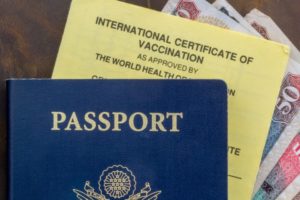Zika Virus Reinforces Need for Travel Immunization
 Recent outbreaks of the Zika Virus have prompted The World Health Organization to declare an international health emergency. This recent scare has only intensified the need for people traveling to other countries to consult their health care providers in regards to travel vaccinations and medications. Although there may be no vaccine for the Zika Virus yet, there are a host of other infectious diseases and viruses that can be preempted with the correct immunization planning.
Recent outbreaks of the Zika Virus have prompted The World Health Organization to declare an international health emergency. This recent scare has only intensified the need for people traveling to other countries to consult their health care providers in regards to travel vaccinations and medications. Although there may be no vaccine for the Zika Virus yet, there are a host of other infectious diseases and viruses that can be preempted with the correct immunization planning.
Immunization prevents illness, disability and death from vaccine-preventable diseases while you are in a foreign ecosystem. Preparation for foreign travel should always include a visit to your physician to discuss health safety and recommended immunizations for all upcoming travel destinations. Before departing for a trip outside the United States, ask a doctor about:
- Setting up an appointment for immunization four to six weeks before intended departure
- Routine vaccinations and medicines recommended or required for entry into specific countries
- Personal health issues, which may increase your risks for disease or complications
Additionally, ask your Abraham Medical health care provider about vaccinations and medicines for the following diseases before leaving the country for international travel:
Malaria
Malaria is a disease spread exclusively through mosquito bites. Symptoms include fevers, chills, and flu-like illness. Without treatment, malaria can lead to severe illness and even death.
Malaria occurs in Africa, Central and South America, parts of the Caribbean, Asia, Eastern Europe and the South Pacific.
Hepatitis A
Hepatitis A is a liver disease spread by contaminated food and water. It can also be spread from the hands of a person already infected. Symptoms include a sudden fever, exhaustion, loss of appetite, nausea, vomiting, stomach pain, and jaundice (yellowing of the skin and eyes).
Hepatitis A is a common infection among travelers to developing countries. These areas include all parts of the world except Canada, Western Europe and Scandinavia, Japan, New Zealand and Australia. Travelers going to rural areas in developing countries are at a higher risk of infection.
Hepatitis B
Hepatitis B is a contagious virus that is transmitted through blood and other body fluids. Travelers can become infected through unprotected sex with an infected person, injection drug use and transfusions with unscreened blood. Common symptoms include fever, exhaustion, loss of appetite, vomiting, stomach issues, dark urine, joint pain and jaundice.
Though it is prevalent all over the world, hepatitis B is most common in Asia, Africa, South America and the Caribbean.
Typhoid
Typhoid is a serious disease spread by contaminated food and water. The most prevalent symptom is a lasting high fever, but those infected also commonly experience weakness, stomach pain, headache and loss of appetite. Internal bleeding and death can occur but are rare.
Typhoid is common in most parts of the world except the United States, Canada, Western Europe, Australia and Japan, so travelers to other countries should consider taking precautions. Travelers to Asia, Africa and Latin America are especially at risk.
Lastly, international travelers should take extra precautions to avoid mosquito bites while abroad. Using bug spray, sleeping in special preventative netting and wearing long-sleeved clothing are all simple protections from potential bites. With the threat of serious infection and disease in the air, safe is always better than sorry.
Contact Abraham Family Medicine today for information on travel immunization and what we can do to help you properly prepare for your next overseas trip. With over 50 combined years of experience, Dr. Ben Abraham and his highly trained medical team have the expertise and answers you can trust.
